Introduction
The article
- Title: “The Social Responsibility of Business is to Increase its Profits”
- Author: Milton Friedman
- Published in: New York Times Magazine
- Date: September 13, 1970.
Main points
- Social responsibility in business world
- Attitudes of business people
- Stakeholders
- Practices of social responsibility
- Outcomes
This presentation revolves around an article by Milton Friedman that was published in 1970 in New York Times Magazine. The article is titled “The Social Responsibility of Business is to Increase its Profits”. Its main focus is on the concept of social responsibility in business world, the attitudes of business people towards it, and the overall practice of social responsibility in business (or lack thereof).
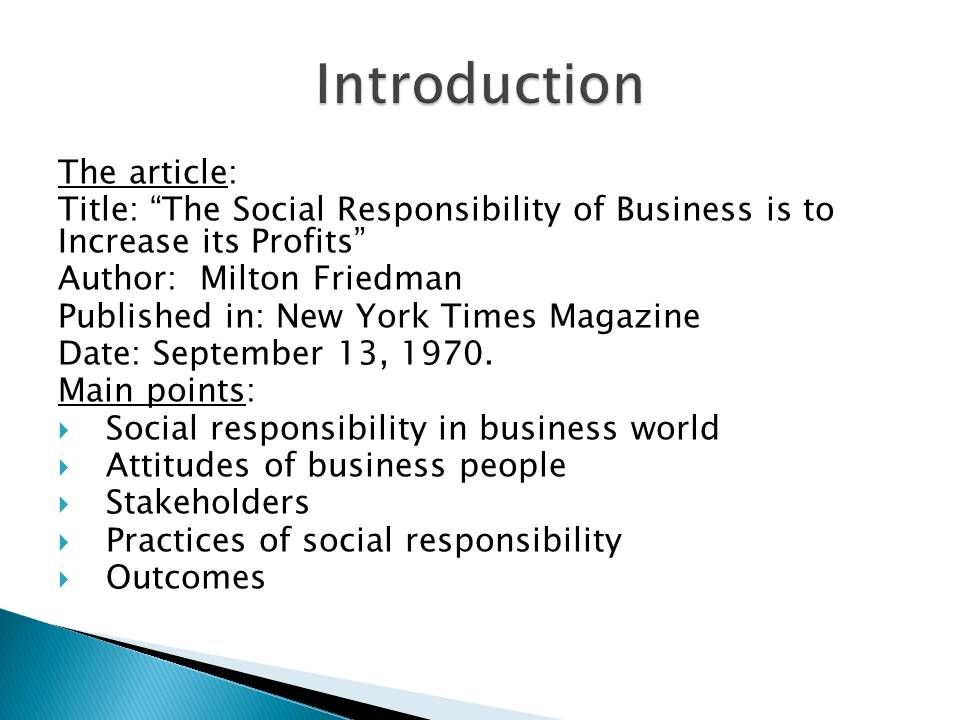
Social Responsibility in Business as a Concept
- Is a commonly mentioned issue
- Resembles a fashionable trend
- Is obvious, but is spoken about as if it is a groundbreaking discovery
- Used as a means for self-promotion and self-advertising
Social responsibility in business is an issue that is discussed commonly in the business settings. The problem is relevant to any society, any workplace, and any type of business. However, in the article, Friedman (1970) points out that the issue began to resemble a fashionable trend – a problem every business owner feels obliged to talk about in order to produce an impression of a responsible professional. That way, regardless of the fact that the need for social responsibility in business is quite obvious, it is often regarded as a fresh perspective or some groundbreaking discovery. In turn, many business people tend to abuse this concept and its different variations in order to promote their companies and improve their image.
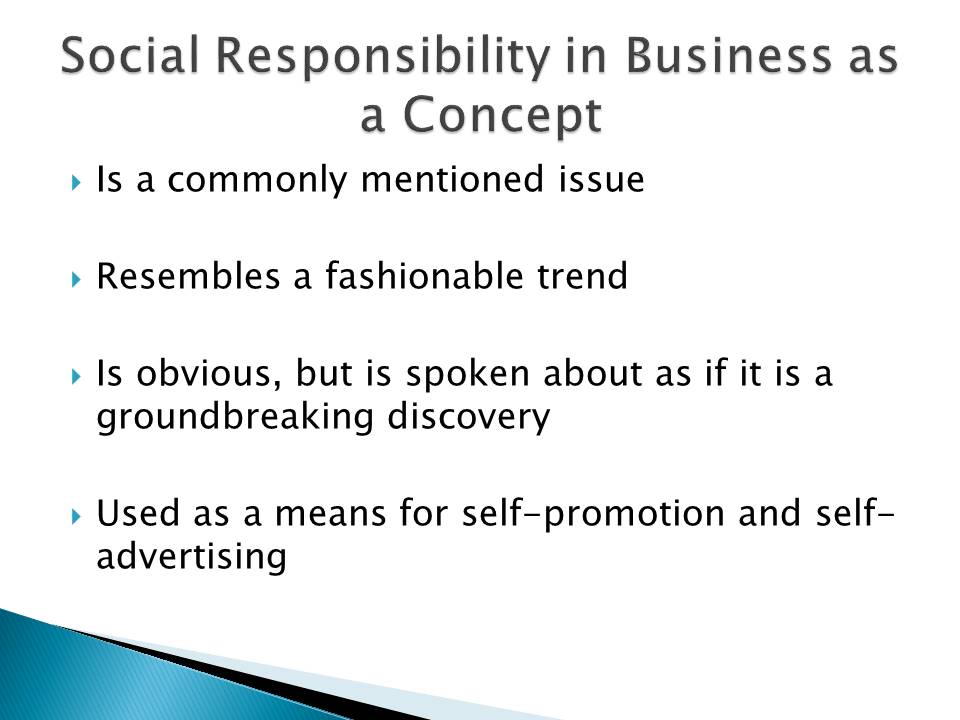
Stakeholders in Social Responsibility
There are multiple stakeholders in different types of business organizations
- Employees
- Customers
- Landowners
- Shareholders
- The society
- The environment
Examples of social responsibility issues and activities
- Fair and equitable treatment of workers
- Provision of quality goods and services to the customers at affordable prices
- Transparency in relations with the shareholders
- Sustainability of operations to avoid harming the environment
- Taking into consideration social trends – tolerant attitudes in the workplace, inclusion, safety.
When it comes to social responsibility, the number of stakeholders depends on business organizations and their specializations. However, it always involves many sides. Some of them are the employees, the customers, landowners, shareholders, the environment, and the society in general. In other words, attempting to be socially responsible includes many possible activities.
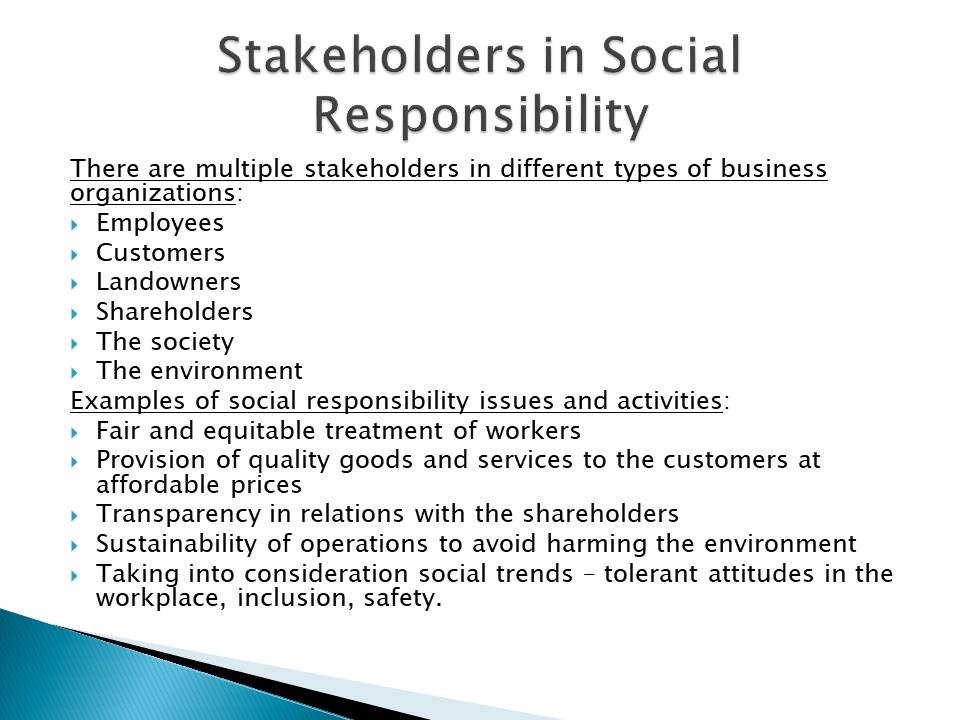
Performing Social Responsibility
Definition of social responsibility:
“make as much money as possible while conforming to the basic rules of the society, both those embodied in law and those embodied in ethical custom” (Friedman, 1970, p. 1).
Executives have a responsibility to take care of the interests of the other stakeholders apart from their employers.
As briefly and generally defined by Friedman (1970), social responsibility is a business owner’s task to “make as much money as possible while conforming to the basic rules of the society, both those embodied in law and those embodied in ethical custom” (p. 1). The primary challenge in the issue of social responsibility is for the executives to fulfill the needs of the sides different from their employers. It is needless to mention that such sides often have interests that do not align with the major objectives of the executives (such as that of making as much money as possible).
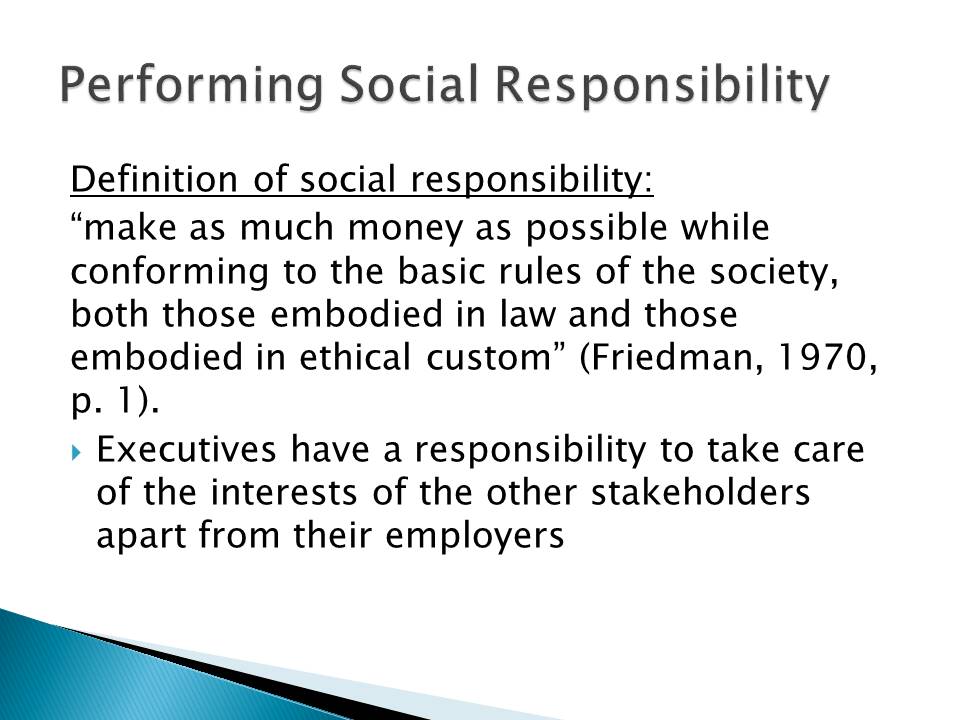
Company and Stakeholders
A company’s direct interests may not always work along with the stakeholder interests and needs.
Examples
- Preventing pollution costs money and time
- Keeping prices lower is what the consumers would like
- Raising salaries is what the employees are interested in
All of these activities clash with the company’s interest of making as much money as possible.
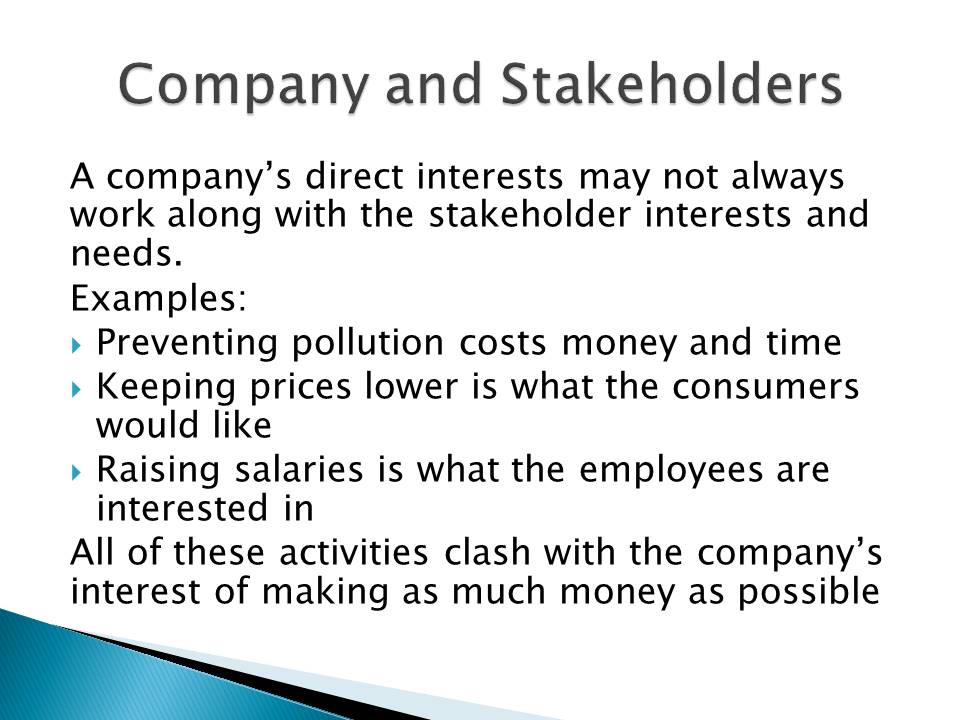
Financial Aspect of Social Responsibility
For an executive, making a certain business decision means spending someone’s money:
- Money of consumers when raising a price
- Money of investors when implementing anti-pollution measures
- Money of employees when cutting the salaries
The financial implications of business decision in terms of social responsibility are far-going. Practically, making a business decision, an executive decides to spend the money of a certain group of stakeholders. In turn, this action carries another series of political implications and a manipulation that involves costs of particular groups of individuals.
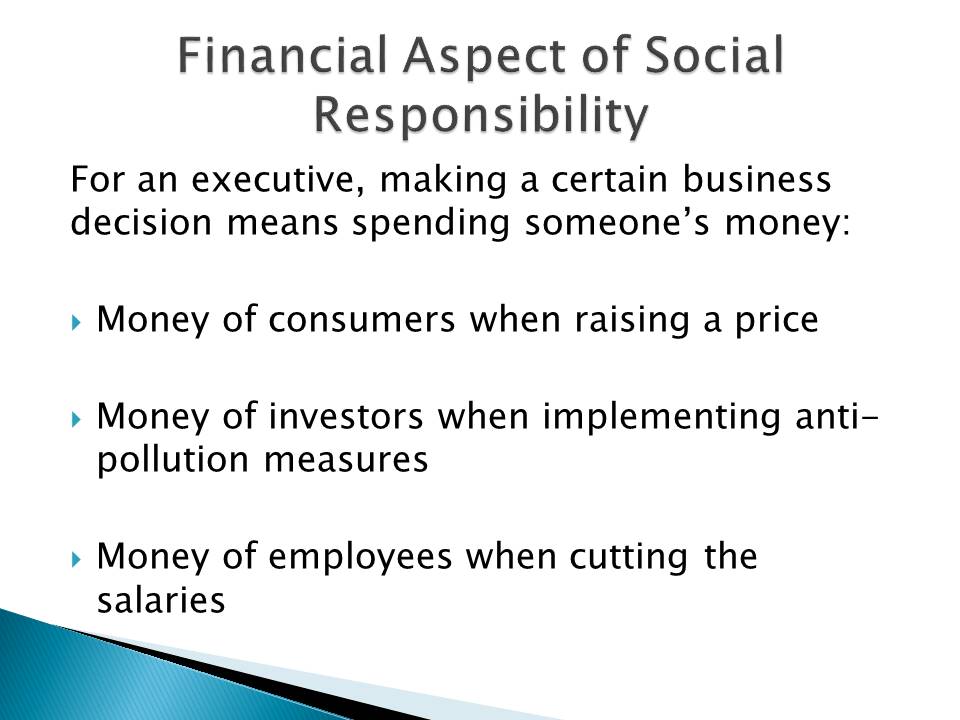
Political Perspective
The actions of an executive qualify as:
- Imposition of taxes
- Expenditure of tax money
Both are governmental tasks (Friedman, 1970).
- Governmental taxes are regulated by specialized agencies
- Taxes imposed by businesses are regulated only by these businesses (with the consideration of “general exhortations”)
Friedman (1970) specifies that from the political perspective, the actions of an executive as to the business decision-making that involves the stakeholders’ capitals qualify as the imposition of taxes and the expenditure of tax money. This activity falls under the list of the governmental duties and is regulated by various agencies (jurists and legislators). However, when imposed by the individual businesses, such actions are not regulated by any outside agencies. On the contrary, the businesses are the only sources of control.
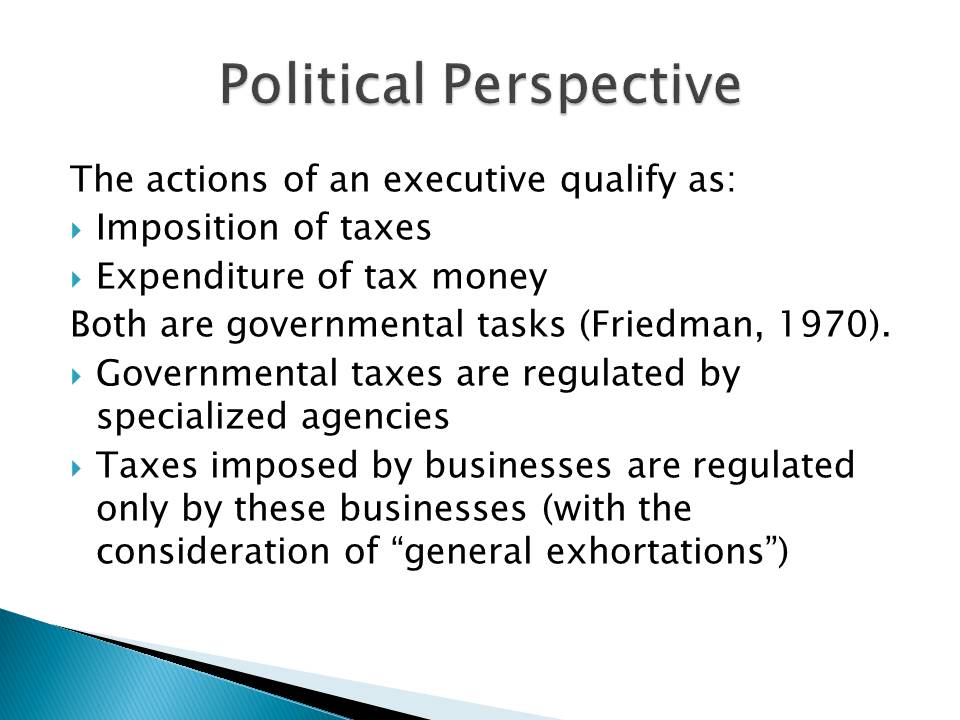
Roles of Executives
- In business, executives are elected by the shareholders
- Their role is to represent and serve the interests of the business
- Within social responsibility, an executive represents the interests of some other group of stakeholders
- As a result, a social responsibility agent is to be elected by the community he or she represents in a political manner
The roles of an executive are clear when he or she acts on behalf of a business organization – their duties are to represent this business and its shareholders and act according to their interests. However, implementing social responsibility policies and measures, an executive automatically becomes an agent of social responsibility and represents the interests of another group of shareholders. Logically, such agent is to be elected by the group he or she speaks for through a political process.
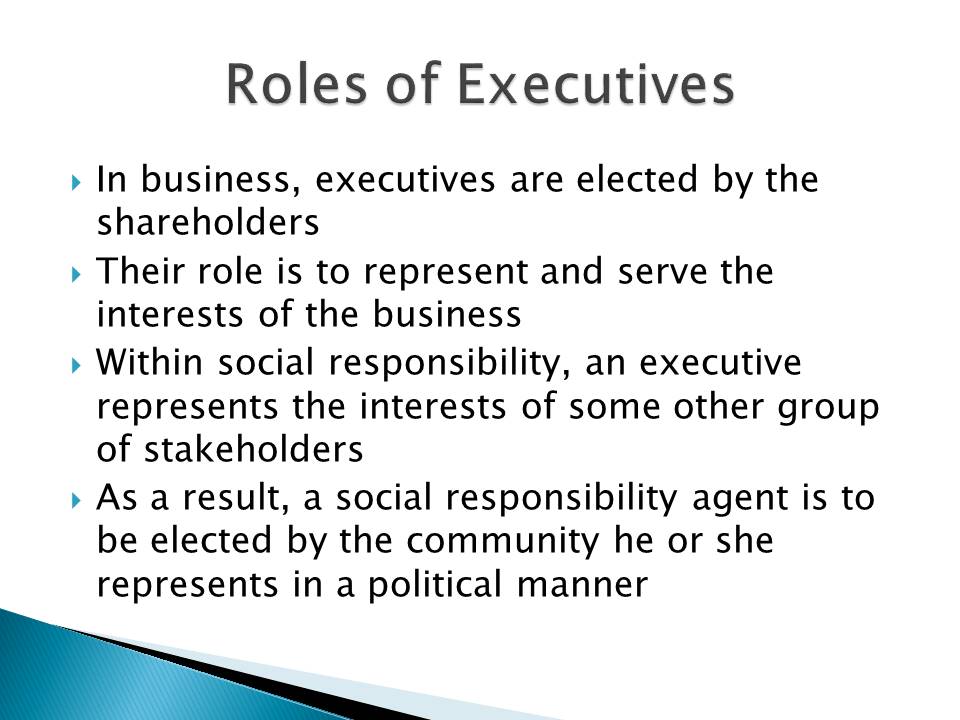
Challenges and Questions
Socialist view: political and not market principles are to be applied to situations related to allocation of scarce resources
If allowed to spend the money:
- Can the executive reject working within social responsibility duties?
- How can he or she know how to spend the money?
- Based on what knowledge should the decisions be made?
- What consequences will this decision-making produce for the executive and for the stakeholders?
Friedman (1970) notes that this issue can be regulated based on socialist view of applying the political and not market principals to the situations connected to the allocation of resources. Also, the author points out that the issue of social responsibility is very tricky for the executive as well as the other groups of stakeholders. There are many questions that can be concerned in this situation. For instance can an executive give up social responsibility roles or are they obligatory? How can he or she decide how to spend the money if they are not an expert in social issues? Finally, what are the potential consequences? Potentially, the interests of one group of stakeholders may clash with the interests of another, so will an executive put themselves in the middle of a conflict and risk losing their job?
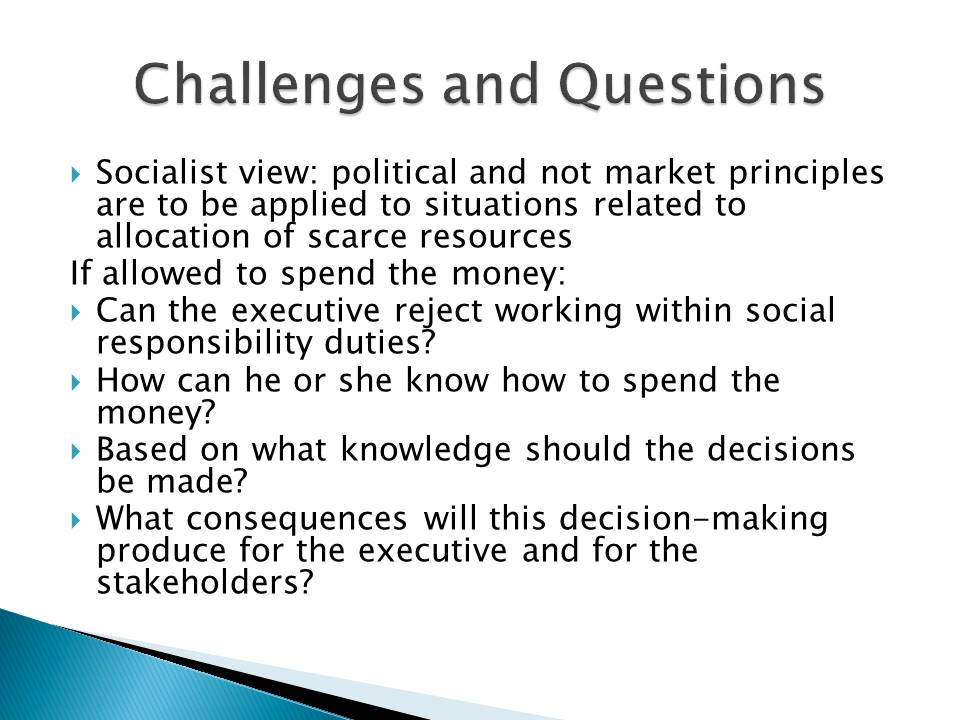
Twofold Issue
Private competitive enterprise:
- Creates the need for the businesses to care about the stakeholders’ interests
- Puts them in a position of risk because one cannot satisfy everyone’s desires
On the one hand, private competitive enterprise is a virtuous entity because it creates the need for the businesses to work to fulfill the needs of various groups of stakeholders in order to remain at the top of the industry. On the other hand, the same entity puts the businesses and their executives in the strict frameworks of rules where they are to satisfy as many stakeholders as possible and thus find themselves in a dead corner because often the interests of one group clash with those of another and there is always a conflict resulting from a virtuous action.
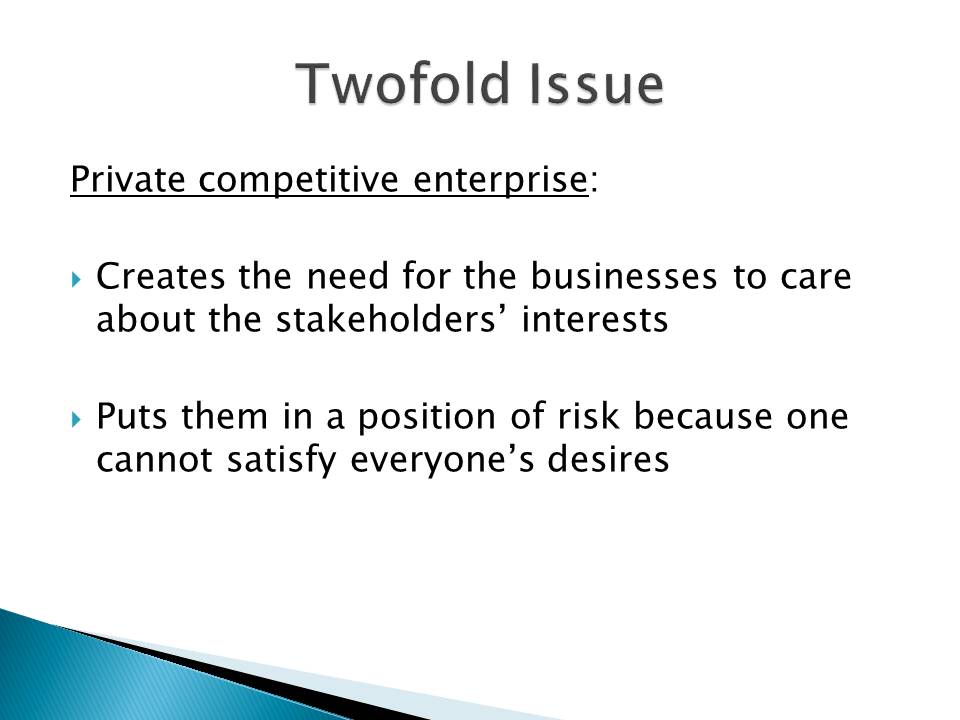
The Doctrine of Social Responsibility
According to Friedman (1970), “in practice the doctrine of social responsibility is frequently a cloak for actions that are justified on other grounds rather than a reason for those actions” (p. 5).
- Social causes may be artificially created by the stakeholders interested to benefit from them
- For an individual proprietor, social responsibility is not as much of a political and ethical challenge as they spend their own costs and have a diminished ability to impose taxes
As a major employer, a corporation is the kind of business that faces the primary issues of social responsibility and interacts with a large number of stakeholders.
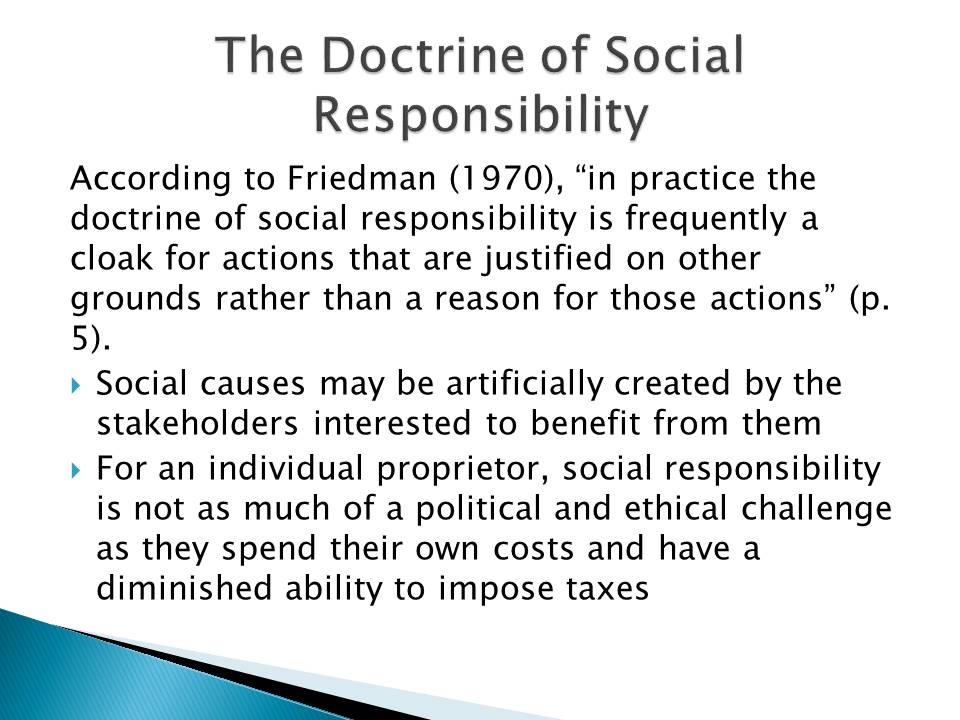
Problem
- Business executives in large corporations face the issues of social responsibility
- This is always a challenge as it clashes with the selfish interests of money-making
- Business people may be shortsighted when it comes to making decisions that do not focus on business matters
Due to these issues, social responsibility poses a challenge for the executives because not only is it difficult to make socially responsible decisions but also puts the executives in risk of developing a conflict with some of the shareholder groups or choosing a wrong path for the future development of a business.
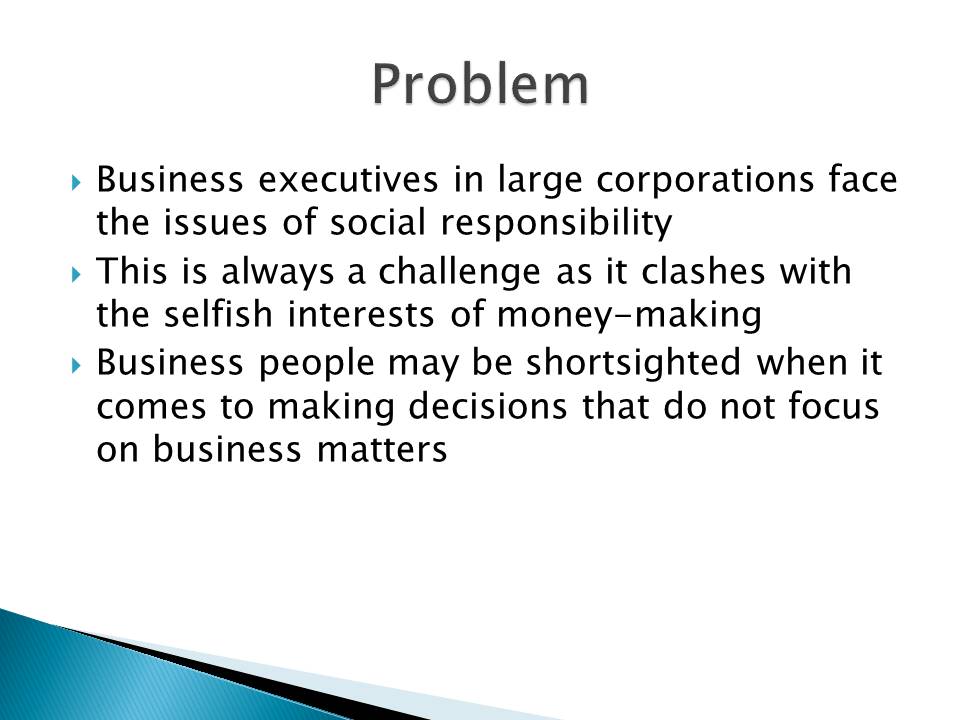
Unanimity and Conformity
Unanimity
- The principle at the basis of market approach
- Suitable for ideal environment where everyone either benefits or has not need to participate in social responsibility actions
Conformity
- The principle at the basis of political approach
- The individuals act in alignment with the frameworks established by the majority
Unanimity and conformity are the two principles that can be applied in social responsibility. Unanimity is not always the case, and that makes conformity inevitable.
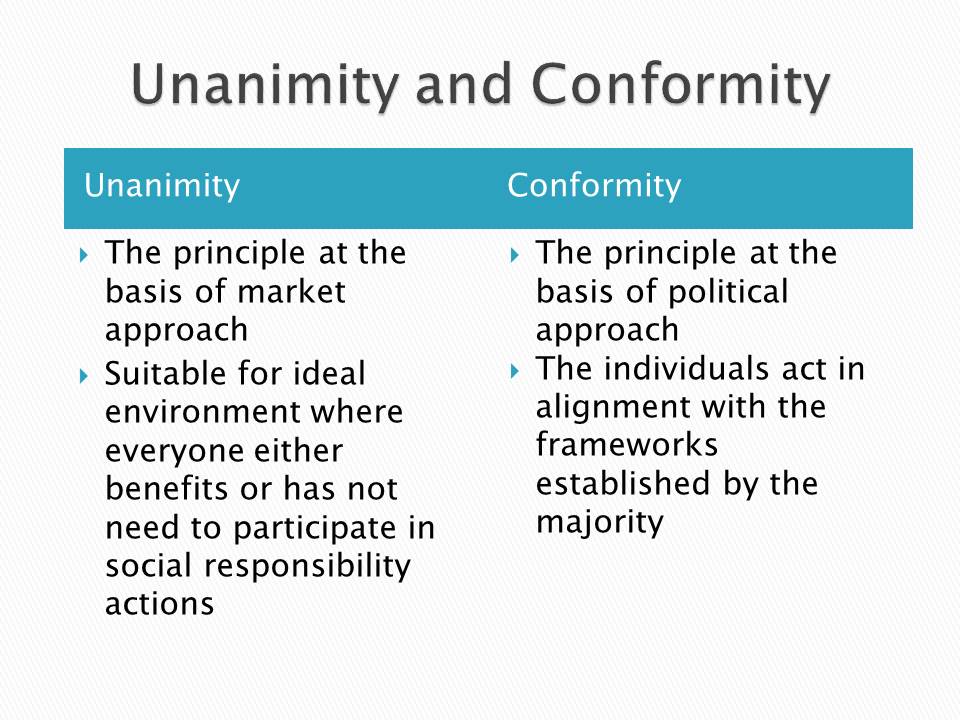
Conclusion
- Application of political approach is the only suitable perspective
- In a free society, “there is one and only one social responsibility of business–to use it resources and engage in activities designed to increase its profits so long as it stays within the rules of the game, which is to say, engages in open and free competition without deception or fraud” (Friedman, 1970, p. 7).
Based on the previous statement, Friedman (1970) makes a conclusion that the application of political approach in business matters that involve the allocation of resources.
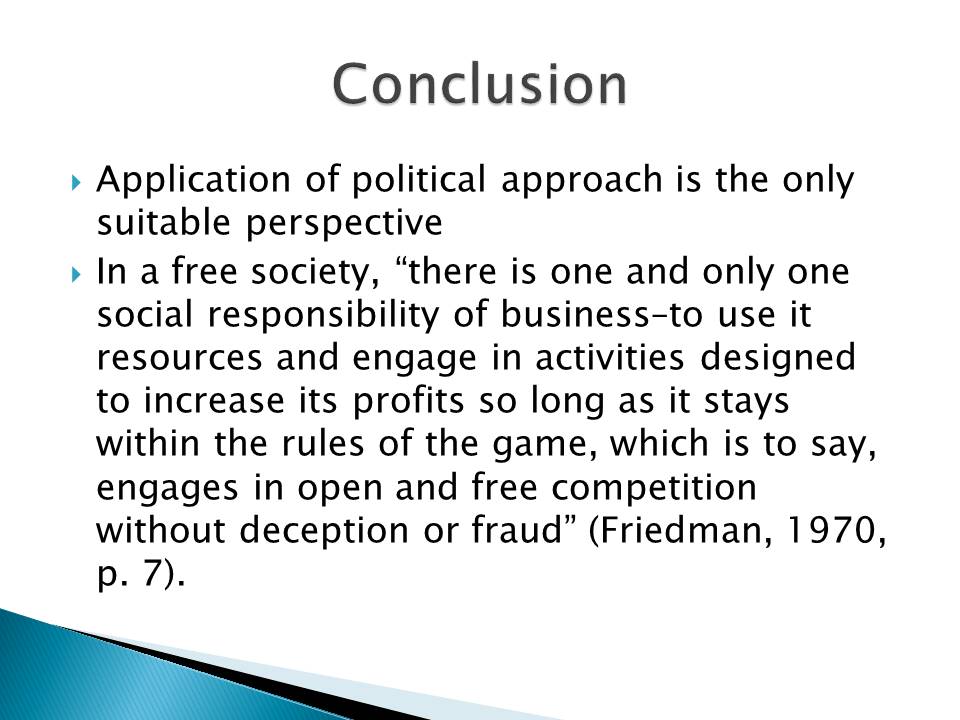
Reference
Friedman, M. (1970). The Social Responsibility of Business is to Increase its Profits . The New York Times Magazine, 1-7.